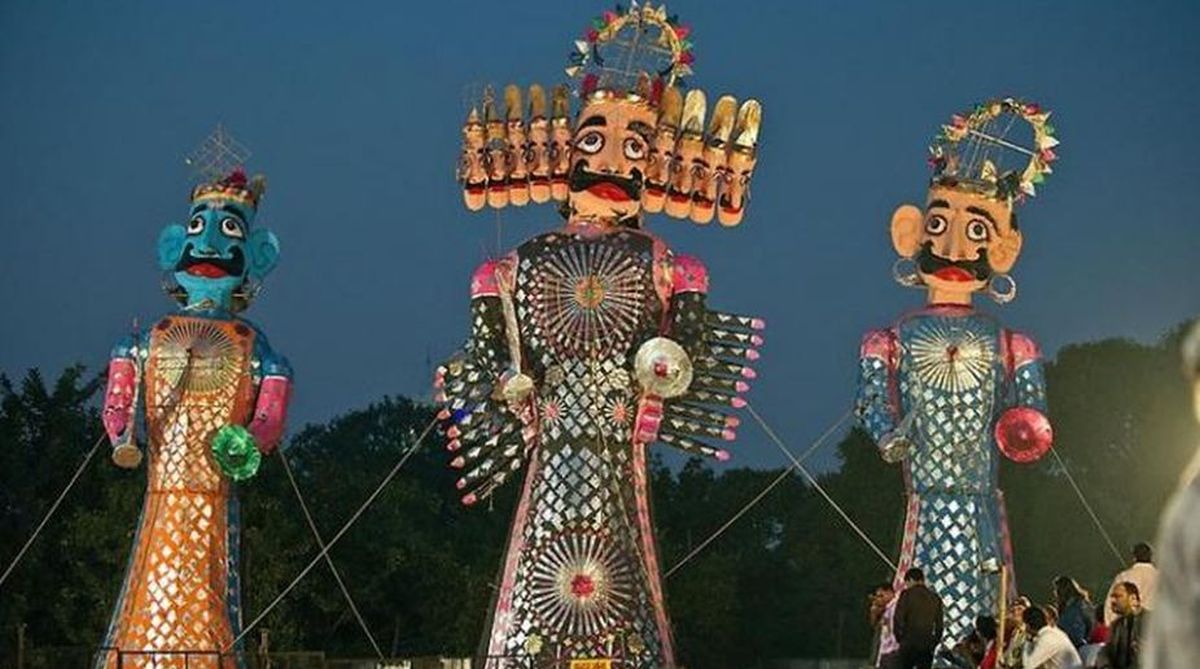Different rituals are associated with the celebration of any festival in India and this holds true for Dusshera as well.
Dusshera or Vijaya Dashmi is a popular Hindu festival widely celebrated in India on the tenth day of the Navratri festival in Ashwin month Of Hindu calendar. It marks the end of the nine-day spiritual festivity and symbolises the triumph of righteousness over evil.
Advertisement
While in the northern parts of India, the festival commemorates the legend of the victory of Lord Rama over the demon king Ravana, in the eastern, western and southern regions of the country, the festival of Navratri culminates with Dusshera and commemorates the legend of the victory of Goddess Durga over the demon Mahishsura.
Different cultures give different flavours to the sacred and joyous celebration. The festival is soaked in the rainbow colours of fascinating rituals which are truly charming and worth knowing.
- In the northern parts of India, a tiny version of Ravana is made of cow dung in the open courtyard of the house. This ritual is performed in the morning after the spiritual bath. The whole family gathers around the image of the demon king and perform some rituals. In the evening, it is burnt.
- Effigies of Ravana are burnt with spectacular firecrackers reaching the sky. When the whole India just revels in the festival, some people bring home the charred remnants of Ravana’s effigy to seek his blessings during their hard times. Ravana was a learned person and a big follower of Lord Shiva. He had deep knowledge of all Vedas. During his last moments, Lord Rama also asked his brother Lakshmana to seek lesson from the demon king. A few think that evil has burnt down and keeping the remnants at home will protect it from all misfortunes like robbery, accident or sickness. Some believe that a piece of Ravana effigy remnant will help improve their financial condition.
- One of the key rituals followed on this day is to bring in Shami leaves to home after the burning of Ravana’s effigy. While burning of Ravana’s effigy indicates abolishing the demonic powers, the incoming of the Shami leaves indicate bringing prosperity and success. Shami is traditionally a tree found in the Thar Desert of Rajasthan. It has a great cultural relevance and hence considered to be very auspicious.
- In some parts of the country, sisters perform the ritual of ‘tilak’ on their brother’s forehead which follows the same line as Raksha Bandhan or Bhaiya Dooj.
- The day is also marked by a grand feast organised for son-in-laws and daughters of the family. They are given all honour and ‘shagun’ envelopes or gifts after the feast.
- This day is considered to be very auspicious to start a new venture or business or to make a new investment by way of buying home or vehicle etc. The day of Vijaya Dashmi is believed to bring ‘vijaya’ that is victory. Thus, doing such things are considered favourable.
- In few places vehicles like bikes, scooters and cars are worshipped by offering garlands of saffron marigold. The decoration of houses with saffron marigold flowers is also considered to be very favourable.
- On this day, in some communities, there is a tradition of worshipping tools, instruments and machines by artisans and merchants. Students also worship their books and other stationeries like pen to seek Goddess Saraswati’s blessings. Weapons are also worshipped as a symbol of fighting injustice.
- In the eastern parts of the country, particularly West Bengal, the devotees bid farewell to Goddess Durga very ceremoniously. The custom is called as ’visarjan’. Idol of the deity that is worshipped during nine days of Navratri is immersed into the nearby sea, river or lake by the devotees on the tenth day of the pooja, that is, the day of Dusshera.
- On this day, married women in West Bengal also play among themselves with vermillion (sindoor) as a part of Dusshera ritual.
There are many more customs and traditions of celebrating Dusshera festival. Even till this date, people follow these traditions in the hope of attaining money, power, success and prosperity.
May this dusshera doubles your wealth, health and happiness. Wish you a bountiful Dusshera!
